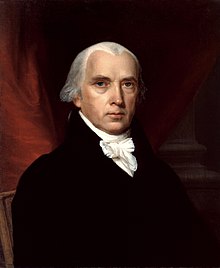📖 Presidential Profile
Comprehensive overview of leadership, policies, and historical significance
📋 Biography & Political Journey
Constitutional Convention and Bill of Rights
James Madison was born on March 16, 1751, in Port Conway, Virginia, into a prominent planter family. Educated at Princeton University, Madison was deeply influenced by Enlightenment philosophy and became one of America’s most important political theorists. His extensive study of historical governments and political systems prepared him to play a crucial role in creating the American constitutional system.
At the Constitutional Convention of 1787, Madison arrived with a comprehensive plan for a new government, later known as the Virginia Plan. His detailed preparation and thorough understanding of political theory earned him recognition as the “Father of the Constitution.” Madison advocated for a strong federal government with separation of powers and a system of checks and balances to prevent tyranny. His notes from the convention remain the most complete record of those historic proceedings.
Despite his role in creating the Constitution, Madison later became concerned about the lack of explicit protections for individual rights. Working with Thomas Jefferson, he led the effort to add the Bill of Rights to the Constitution. Madison drafted the first ten amendments, which guaranteed fundamental freedoms such as speech, religion, and press, addressing the concerns of Anti-Federalists who feared government oppression.
Political Partnership with Jefferson and Presidential Leadership
Madison’s political partnership with Thomas Jefferson defined early American politics. Together, they founded the Democratic-Republican Party to oppose Alexander Hamilton’s Federalist policies, which they viewed as too favorable to wealthy merchants and potentially monarchical. Madison’s political theory emphasized limited government, states’ rights, and strict interpretation of the Constitution.
As Jefferson’s Secretary of State from 1801 to 1809, Madison helped implement the Louisiana Purchase and dealt with increasing tensions with Britain and France during the Napoleonic Wars. His presidency began in 1809 during a period of international crisis, as both European powers were interfering with American shipping and impressing American sailors into their navies.
The War of 1812, sometimes called “Madison’s War,” dominated his presidency. Despite initial military setbacks, including the burning of Washington D.C. in 1814, American forces eventually achieved significant victories. The war’s end brought a surge of national pride and confirmed American independence from European interference, though it exposed serious weaknesses in American military preparedness.
Controversial War of 1812 Decisions
Madison’s decision to declare war on Britain in 1812 proved highly controversial, particularly in New England where merchants opposed the conflict due to its impact on trade. The Hartford Convention of 1814-1815 saw New England Federalists seriously discuss secession from the Union, threatening national unity. Madison was criticized for leading the country into war despite inadequate military preparation and financial resources.
The president’s handling of civil liberties during wartime also sparked controversy. His administration prosecuted critics of the war under common law sedition principles, and military commanders sometimes imposed martial law in threatened areas. These actions seemed to contradict Madison’s earlier advocacy for civil liberties and limited government, leading to accusations of hypocrisy from political opponents.
America’s Smallest President
At 5 feet 4 inches tall and weighing only about 100 pounds, James Madison was the smallest president in American history. His diminutive stature often surprised visitors to the White House, and political opponents sometimes mocked his physical appearance. During the War of 1812, when British forces approached Washington D.C., the tiny president personally rode out to observe American troops preparing for battle, creating an amusing scene of the nation’s smallest commander-in-chief trying to rally much larger soldiers. Madison’s wife Dolley often towered over him at social events, and she became famous for her elaborate parties and fashion sense, providing a striking contrast to her modest husband. Despite his small size, Madison possessed a large intellect and quiet determination that earned him respect from even his political enemies.
Humor & Jokes
Federalist Papers
Madison co-wrote the Federalist Papers to sell the Constitution. Political marketing before marketing was invented.
Read More →Greatest Wins
📜 Drafting and Championing the U.S. Constitution
Madison's masterful Constitutional framework created the world's most enduring democratic republic, establishing checks and balances…
Read More →Epic Fails
📜 The Alien and Sedition Acts Crisis and States' Rights Response
Madison's Virginia Resolutions challenged federal authority, sparking debates about nullification that would haunt America for…
Read More →